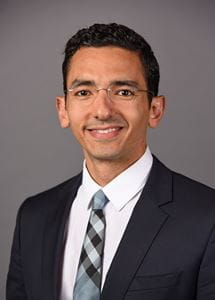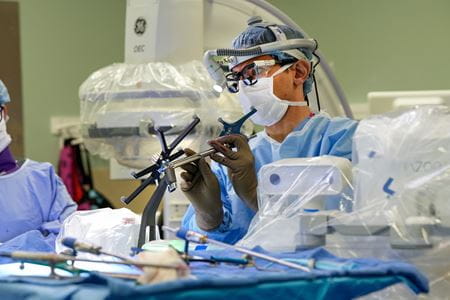Whenever Mohamed Zaazoue, MD, MS, MBA, would see his name assigned to the operating room schedule of Scott Shapiro, MD, during the first few years of his neurosurgery residency at the IU School of Medicine, he knew the day would be good — no matter the surgery.
“He is the kind of mentor who makes you enjoy waking up every day and going to work,” Zaazoue said. “Dr. Shapiro ensured to create and maintain a culture where neurosurgery residents can thrive.”
Zaazoue, currently a complex spine deformity fellow at the Washington University School of Medicine in St. Louis, matched as a resident in the IU School of Medicine Department of Neurological Surgery in 2017 when Shapiro was the residency program director, a role he served for decades before retiring in 2021 after 34 years as a department faculty member.
Through six years as a resident and one year as an enfolded neuro-oncology fellow, Zaazoue, who graduated residency in 2024, said he enjoyed the department’s culture of collegiality and camaraderie. Because of the unparalleled clinical volume at IU Health, neurosurgery trainees at the school get exposed to the operating room early in the seven-year program.
“It takes a lot of time, effort and dedication to create such a culture,” Zaazoue said. “I am glad that the residency program directorship has been handed to faculty members who have the same approach as Dr. Shapiro, including James C. Miller, MD, Brandon C. Lane, MD, and Rabia Qaiser, MD. As I transition into academic spine surgery, I hope I will carry forward such compassion and dedication to the future trainees I will have the privilege to work with.”

Born into a family of physicians — his father and grandfather were surgeons — Zaazoue knew he would become a physician someday. After initially joining medical school with the thought of becoming a cardiothoracic surgeon, Zaazoue later broadened his surgical interests and eventually landed on neurosurgery after getting “hooked” during his rotation.
“The amount of training it requires and attention to detail got me intrigued,” Zaazoue said. “A distance of a few millimeters can mean the difference between alleviating pain or curing cancer and causing paralysis or even death. Not many specialties can claim that this is their day-to-day work, and while it can sound daunting, I appreciate challenges.”Over the course of his seven years at the IU School of Medicine, Zaazoue was able to translate his “hands-on” approach to life into the operating room — performing more than 1,800 surgeries, many of which were spine and cranial. During his one-year enfolded fellowship, Zaazoue trained under Aaron Cohen-Gadol, MD, a renowned cranial neurosurgeon.
“It is not common for a neurosurgery residency graduate to receive such intense training in both cranial and spine, and I owe this to my mentors’ dedication to my training at IU,” Zaazoue said.
Once his spine deformity fellowship concludes, Zaazoue will start his academic medicine career as an assistant professor of neurological surgery at the University of Wisconsin-Madison.
Neurosurgeons, Zaazoue said, are life-long learners, actively involved in advancing the field.
“I anticipate that I will continue to learn and evolve so I can better serve my patients until I retire in light of the rapid technological advancements we witness in neurosurgery,” he said. “There is so much work to be done in neurosurgery, and I am excited about all the research and innovation I will get to engage in at the University of Wisconsin. Looking back, I know that IU has played a tremendous role in shaping my career and the kind of surgeon I am today.”
